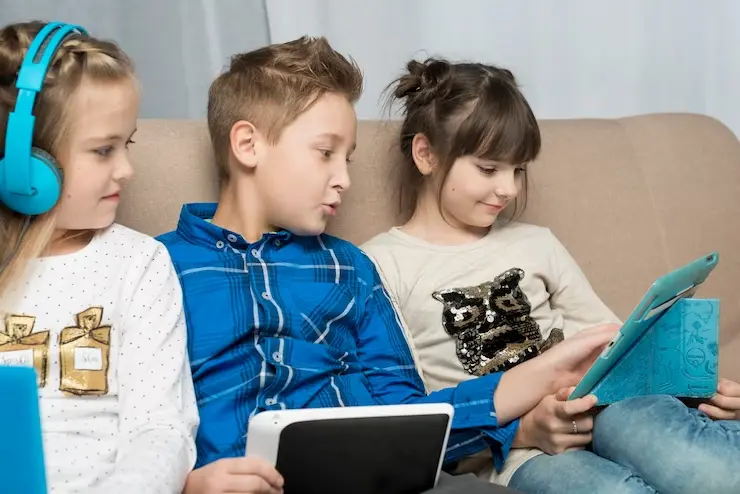In today’s world, technology has become an integral part of our daily lives. The technological boom has not only transformed the way we communicate, work, and learn but has also had a profound impact on the lives of children. From smartphones and tablets to video games and coding classes for kids, technology is shaping the way the younger generation grows up. With children becoming computer experts at a very young age, there is an ongoing debate about the benefits and drawbacks of constant immersion in technology. In this article, we will explore the positive and less than positive ways technology is affecting kids, aiming to provide a balanced perspective on the topic.
Table of Contents
Positive Impacts of Technology on Kids
- Enhanced Learning Opportunities
One of the most significant benefits of technology is the plethora of educational resources available to children. Through online platforms, children can access a wealth of information, making it easier for them to learn and grow. Online classes and tutorials, such as coding classes for kids, can help them develop essential skills that will be useful in the future job market.
- Improved Cognitive Abilities
Research has shown that using technology can improve children’s cognitive abilities, such as problem-solving, critical thinking, and creativity. Video games, for example, can help children develop hand-eye coordination and enhance their spatial awareness. Many educational games and apps are designed to foster children’s cognitive development and help them retain information more effectively.
- Better Communication and Social Skills
Despite the common belief that technology can isolate children, it can actually help them develop better communication and social skills. For instance, children with special needs can benefit from assistive technology to improve their communication abilities. Social media platforms and online communities also offer children the opportunity to interact with others, learn about different cultures, and build relationships.
Less Than Positive Impacts of Technology on Kids
- Health Concerns
One of the major concerns about the impact of technology on kids is the potential negative effects on their health. Excessive screen time can lead to obesity, sleep disorders, and vision problems. Furthermore, prolonged exposure to technology can increase the risk of developing musculoskeletal issues, such as carpal tunnel syndrome or neck and back pain.
- Decreased Physical Activity
With the increasing prevalence of technology, children are spending more time indoors and less time engaging in physical activities. This sedentary lifestyle can contribute to childhood obesity and other health issues. Moreover, reduced outdoor playtime can limit children’s opportunities to develop essential motor skills, socialize with their peers, and explore the natural world.
- Privacy and Safety Risks
Children’s online activities can expose them to privacy and safety risks, such as cyberbullying, identity theft, and inappropriate content. Many children lack the knowledge and maturity to navigate the digital world safely, making them vulnerable to online predators and scams. Parental monitoring and education about online safety are crucial to protect children from these risks.
- Impact on Emotional and Mental Health
Technology can also have adverse effects on children’s emotional and mental well-being. The constant need for validation through social media “likes” and “followers” can lead to feelings of inadequacy, anxiety, and depression. Additionally, excessive exposure to technology can cause children to become dependent on it for entertainment, making it challenging for them to enjoy traditional, non-digital activities.
Finding the Right Balance
Given the myriad impacts of technology on kids, it is essential to find a balance between harnessing the benefits and mitigating the negative effects. Parents and educators play a critical role in ensuring children use technology responsibly and mindfully.
Here are some strategies to promote a healthy relationship with technology:
- Set limits on screen time and encourage regular breaks.
- Encourage physical activities and outdoor play.
- Use technology as a tool for learning and creativity, rather than just for entertainment. 4. Teach children about online safety, privacy, and digital citizenship.
- Monitor and regulate the content children consume online.
- Foster open communication with children about their experiences and feelings regarding technology use.
- Encourage and model responsible technology use, setting a positive example for children to follow.
- Make time for technology-free family activities, such as board games, outdoor sports, or family meals.
In Conclusion
The impact of technology on kids is a complex issue, with both positive and less than positive aspects. While technology can provide children with incredible learning opportunities, improve their cognitive abilities, and enhance their communication and social skills, it can also pose risks to their health, privacy, and emotional well-being. By finding the right balance and adopting responsible strategies, parents and educators can ensure that children benefit from the advantages of technology without compromising their overall development and well-being. Ultimately, fostering a healthy relationship with technology will equip the younger generation with the skills and resilience they need to navigate the digital world and thrive in the future.

